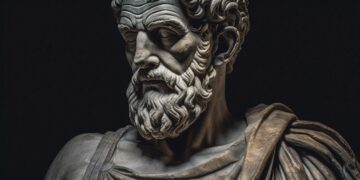Chrysippus of Soli, born near present-day Mersin in Turkey around 280-207 B.C., stands as an emblematic figure in Stoicism. Alongside Zeno of Citium, he is considered a co-founder of this philosophical movement. His journey began at the Academy under the guidance of Arcesilaus, but he later joined the Stoa Poikile in Athens. There, as a disciple of Cleanthes, he succeeded him as the head of the school in 232 B.C., holding this position until his death.
Chrysippus, of Phoenician roots, lived a life of poverty despite his prolific literary output. Shunning the path of wealth, he subsisted through the support of friends and teaching. His Greek writing style was noted for its clumsiness, reflected in the term “solecism,” derived from his hometown, Soli. Nonetheless, he was an extremely prolific writer, authoring about 705 papyrus scrolls, none of which survive today.
In terms of philosophical contribution, Chrysippus played a crucial role in systematizing Stoicism. He made notable advances in propositional logic, organizing it as an intellectual discipline for the first time. This groundwork allowed the Stoics to make significant strides in mathematics and science. Among his numerous works on logic, his writings on the Liar Paradox are particularly distinguished.
In physics, Chrysippus made distinctions between “whole” and “universe,” arguing that the “whole” is the world, while the “universe” encompasses both the external void and the world. He believed that logic and physics were necessary to differentiate between good and evil, and held that knowledge of physics was essential before formulating ethics.
Chrysippus also developed a sophisticated theory of knowledge, primarily empirical and based on perception. However, he allowed for certain ideas and principles established by the agreement of humanity. In mathematics, he contributed the notion that “one” is a number, a concept not universally accepted in his time.
His death is shrouded in various accounts, including one suggesting he died of laughter and another mentioning the consumption of excessively strong wine. Chrysippus’ influence on Stoicism is such that it’s been said: “Had there been no Chrysippus, there would have been no Stoicism.”





